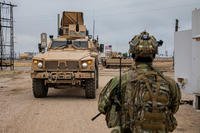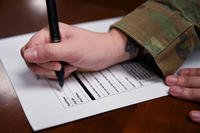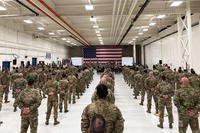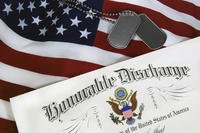This information guide is intended to help address redeployment issues and concerns you or your family might have. The reuniting process involves changes for both you and your family. Knowing what to expect, how to deal with the changes and where to get help, can make homecoming enjoyable and less stressful for everyone.
OVERVIEW
Redeployment involves reuniting with your loved ones and getting reacquainted as a family. It is also a time to take care of yourself, emotionally and spiritually. Basic information about these important topics is provided in this guide, including information about locating resources to assist you and your family.
ASSESSING YOUR MEDICAL STATUS
Medical Requirements for redeployment include:
- Completion of a Post-Deployment Health Assessment Form (DD Form 2796)
- Completion of all malaria medication, if prescribed.
- Continue Doxycycline or weekly Mefloquine (LARIAM) or Chloroquine for 4 weeks after departing theater.
- If prescribed Malarone must be taken for only 1 week after return. Also take 14 days of Primaquine, if prescribed, 1 tablet (15mg) daily.
- Post-deployment tuberculosis skin test (TST) is required at the time of re-deployment and again between 3 and 6 months later.
See your Community Health Nurse, Public Health Department, Reserve unit medical support or private health care provider for testing.
POTENTIAL CHANGES IN YOUR HEALTH
Most soldiers experience minor, temporary changes in their health after redeployment, mostly due to the stress of the mission, deployment travel, jet lag, and adapting to a different schedule and diet. You may feel tired, with sore or achy muscles, or experience a change in appetite. These effects should be temporary, and diminish as the days go by. If these effects do not improve, or if they seem to be getting worse, be sure to see your health care provider. The first symptoms of some illnesses, especially some infections, may not appear until days, weeks, or even months after contact. For this reason, it is very important that you tell your physician where and when you were deployed.
QUESTIONS YOU MAY HAVE ABOUT YOUR HEALTH
WHAT WERE THE ENVIRONMENTAL CONDITIONS WHERE I WAS DEPLOYED?
The military has performed in-depth assessments at many of the base camps in countries throughout the world. The environmental conditions in some countries can affect your health. Desert areas of Southwest Asia have high levels of particles in the air, such as dust. The military documents information pertaining to the quality of the water, soil, and air and uses this information to employ preventive medicine procedures to keep you healthy while you are deployed and after you return home. The military continues to conduct research to minimize the effects of these conditions and prevent impairment of your health.
COULD I HAVE BEEN EXPOSED TO ANY DISEASES THAT I MIGHT GIVE TO MY FAMILY?
Some conditions, such as malaria, TB, and sexually transmitted diseases, can be passed from one person to another. If you have been diagnosed with any of these conditions, make sure you understand precautions to avoid transmission.
REUNION WITH YOUR LOVED ONES
Returning home can be every bit as stressful and confusing as leaving. It is essential that you arrange to spend time with your family and loved ones soon after you return from deployment. You will find it helpful to resume family routines and personal spiritual routines that are effective, but proceed slowly in reestablishing your place in the family. Be prepared to make some adjustments. The following suggestions are intended to help you and your loved ones get reacquainted with as little stress as possible.
Soldiers
- Take time to listen and talk.
- Make time for each child and for your spouse.
- Support the good things your family has done.
- Remember - romantic conversation can make re-entering love relations easier.
- Manage money carefully.
- Don’t overdo the “reunion parties.”
Spouses
- Avoid a busy schedule.
- Go slowly in making adjustments.
- Remind your spouse that they are still needed.
- Discuss division of the family chores.
- Stick to a budget until you have time to talk about money matters.
- Make time to be alone with your spouse.
- Be patient in rebuilding your relationship.
Children
- Slowly resume the old rules and routines.
- Be available to your child, with time and emotions.
- Let the child be the first to renew the bond.
- Expect some changes in your child.
- Focus on successes; limit criticisms.
- Encourage your child to tell you everything that happened while you were away
EXPECTATIONS FOR SOLDIERS
- Even though you may want to talk about your experiences, your family may not.
- Roles may have changed with regard to basic chores and household duties.
- After a separation:
- Closeness may be awkward at first.
- Children grow up during separations; they may seem different.
- Spouses become more independent, and may need more space.
- You may have to change your outlook on priorities in the household.
EXPECTATIONS FOR SPOUSES
- Soldiers may have changed.
- Soldiers may feel “closed-in” or claustrophobic and may need space to feel comfortable.
- Soldiers often feel overwhelmed by the everyday noise and confusion of home life.
- Soldiers may need time to resume sleeping patterns.
- Soldiers may feel left out and need time to adjust.
- Soldiers may feel hurt when small children are slow to hug them and show emotions.
WHAT CHILDREN MAY FEEL
- Babies less than 1 year old may cry when you hold them; toddlers may not know you at first
- Preschoolers 3-5 years old may be afraid of you.
- School-aged children 6-12 years old may demand more of your time than other children.
- Teenagers may seem moody, and act as if they don’t care.
- Some children may be anxious, fearing your expectations of them.
- Children may have symptoms of minor illnesses.
- Children may be torn by loyalties to the spouse who remained at home.
WHO SHOULD I CONTACT IF I HAVE HEALTH CONCERNS?
Your chain of command, chaplain, and health care provider are all excellent sources of information for you and your family.WHAT ABOUT MY HEALTH CONCERNS IF I’M IN THE GUARD OR RESERVE?
The post-deployment requirements apply to Active, Guard, and Reserve alike. Any health issues identified during or after redeployment should be referred to appropriate medical channels. Completion of a Line of Duty/Notice of Eligibility determination and coordination with your parent unit are essential parts of this process.
Directions for Health Concerns
Step 1 -- Contact your local medical treatment facility with questions, concerns, or symptoms
noticed after deployment.
Step 2 -- If you have symptoms, your primary health care provider can do an initial assessment and provide treatment. If symptoms persist or your health does not improve, ask for referral to a specialist.
Step 3 -- If you require further assistance, contact:




















